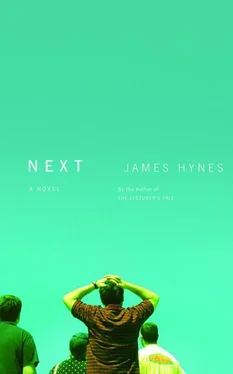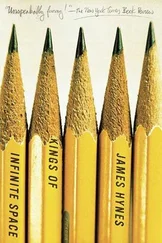Reflecting on all this, Kevin highlighted an intriguing if mysterious ad from Hemphill Associates in Austin, Texas. Hemphill offered “innovative and effective outsourcing solutions” in booming Austin, according to their PW ad, and while Kevin’s tender Ann Arbor heart trembled at the implications — wasn’t it outsourcing that was killing the Michigan economy? — they did want a managing editor — to edit what exactly, they didn’t say — for 20K more than Kevin makes now. He knew better than to think that the private sector would be any less stressful, but at least it would be straightforward, no-bullshit stress: meet the deadline, work under budget, earn your keep. The iron fist is there for all to see, without the velvet glove of “collegiality.”
“It’s all about chi, brother,” the cabbie’s saying. He lifts a big-knuckled hand off the wheel and flicks the yin-yang medallion with his fingernail. It spins, glittering: yin-yang, yin-yang, yin-yang. “Hot and cold,” says the cabbie. “Moist and dry. Shit like that.”
“What?” Kevin is suddenly alarmed. Did I say out loud that I work for the Asia Center? God forbid he should incite an exchange on Eastern spirituality with some half-crazy old Texas Buddhist, some self-taught syncretist who mocked up his own religion out of a split-backed I Ching, a dog-eared Portable Nietzsche, and a lot of Thai stick. Just like McNulty, Kevin thinks, and then his heart nearly hammers to a stop. What if this guy is McNulty? Austin’s just the sort of place a guy like McNulty would wash up, kind of a Southern-fried Ann Arbor, an Ann Arbor with bigger portions. Hailfire, son, ever’thang’s bigger in Texas. Guy’s the right age, that dirty white hair could have been blond once, and McNulty had big bones and powerful hands just like the guy’s hands on the wheel.
But the cabbie’s gaze behind his aviator lenses, framed in the rearview, isn’t heavy-lidded, only watery and weak. And the name on the license, which Kevin can’t read without leaning forward, is shorter than McNulty. And this guy sounds like a native Texan. In the mirror, his glance shows that he knows Kevin hasn’t been listening. His skeletal shoulders sag. They ride without speaking, and as if to fill the awkward silence, the radio voices seem to speak louder, all on their own.
“Turns out one of these guys was a white guy,” says the host, with a deep, old-school radio voice like Rush Limbaugh, or that Canadian guy who used to be on CKLW out of Windsor.
“Kevin something,” says the caller. It sends a chill through Kevin to hear his own name on the radio in this context.
“MacDonald,” says the Limbaugh clone, who adds, with leaden sarcasm, “Oh, excuse me, I mean ‘Abdul Mohammed.’ ”
“They’re calling it ‘666,’ ” says the cabbie, lifting his voice over the radio and raising his gaze to the rearview again. “You heard that?”
“What?” says Kevin, though he knows exactly what the guy’s talking about. 666 said the Fox banner. IS THIS THE END?
“Last Thursday? All that shit in Europe?”
“Sure,” says Kevin.
“They’re calling it 666.”
“Huh.”
“Six bombings, on June 6.”
“I hadn’t heard that,” Kevin says.
“They search you at Metro?”
“Sorry?” says Kevin. The cab has angled off the freeway onto a four-lane road between scruffy tin-roofed houses on the left, and on the right a new subdivision of oversized houses on freakishly green lawns. The meter’s already up to $11.50.
“Fella traveling alone? No luggage?” The cabbie’s rearview gaze interrogates Kevin. “They didn’t take you aside and search you?”
“Yeah, actually,” says Kevin. “They did.” They’d wanded him, anyway. Does that count?
“Funny, you don’t look Muslim.” The cabbie drops his gaze to the road. “I mean, you’re blond, right? Though that don’t mean you’re not a Muslim. I mean, look at that one guy in Buchanan, Scotland, or wherever.”
Kevin’s Irish and his Ann Arbor instincts kick in simultaneously, and at the same moment he glimpses the Austin skyline for the first time, blurred and dull like a painted backdrop, like the Emerald City of Oz. In between the squarish skyscrapers, Kevin glimpses thin, skeletal spires like radio masts. Then the road dips and the skyline sinks behind a screen of trees.
“You think they should search Muslims?” he hears himself say. “For being Muslim?” What does he care? He secretly believes the same thing himself.
“I’m just saying, you got all these guys blowing themselves up and a lot of other folks, too. I seen their pictures on the news, and they ain’t Southern Baptists. Except maybe that Scotch guy, I don’t know what religion they got over there.” The cabbie’s watching the rearview for Kevin’s reaction.
Behind his amber lenses, Kevin is speechless. McNulty would never have been a bigot, but then who isn’t anymore? Watching the display of mugshots on TV over the weekend, he had the same thought himself. He can’t help thinking that if Muslims had been banned from Glasgow public transit, no matter what they looked like, no matter what their ethnicity, Buchanan Street Station wouldn’t have become a charnel house. Sometimes, though, in order to be decent, you have to fight your own instincts, and at last he says, “A lot of Muslims died in those bombings.”
He’s only guessing, of course, he actually doesn’t know if this is true. In Amsterdam, Berlin, and Paris, it probably is, but he doesn’t know about Glasgow or Moscow. And how many Muslims are there in Bern? In the whole of Switzerland?
“Well, hell, search everybody then.” The cabbie sounds peeved and resigned; he watches the road again. Christians, Muslims. Moist, dry. It’s all about chi, brother. “It’s only fair. I mean, why single anybody out, right?”
Why, indeed? thinks Kevin. Life goes out of its way to single you out, it doesn’t need any help from the Department of Homeland Security. Take Eileen Burks, for example — five weeks after she lowered the boom on Kevin’s lunchtime hoops, she collapsed in a seizure on the rec center running track. A few days after that she was diagnosed with an inoperable brain tumor. She returned to work for a few weeks wearing colorful headscarves like a fortune-teller, then went home for good to be nursed by her husband — Huh! thought Kevin — and by finals week, she was dead.
The Austin skyline pops up again behind the screen of trees, a little sharper this time. Kevin sees the narrow nipple of the Texas capitol dome. The skeletal masts are construction cranes, each one tall and spindly and one-armed like a carpenter’s square; they hover over narrow tower blocks in various stages of construction, which rise in silhouette like the uneven bars on his stereo equalizer. Condominiums, Kevin guesses, counting five of them before the skyline dips out of sight again. Now the cab’s rolling by an anonymous apartment complex, a herd of dirty-pastel boxes with peaked roofs like Monopoly hotels, their tiny balconies crowded with lawn furniture and Weber grills and potted plants. A limp banner slung between two palms — palm trees! — says $99 MOVE-IN and FREE CABLE. Never mind those pricey downtown high-rise condos, thinks Kevin, that’s where I’d be living if I moved here, or someplace just as bleak and anonymous. At least at first. That would be my bicycle upended on a hook on the balcony, that would be my forlorn cactus hanging in the stifling heat. That would be my palm tree, sort of. Say he comes to Texas, say he sells his house in Ann Arbor right out from under Stella. What would freak her out more, her boyfriend moving to Austin, or her landlord selling the house? In the back of the cab Kevin closes his eyes. Stella — not now. He opens them again behind his sunglasses, sees nothing. That’s assuming he could even sell the house on Fifth Street — he knows people who live in nicer parts of town, Burns Park or the Old West Side or out on Geddes Avenue, who have had their houses on the market for months. He’d be lucky to get what he paid for it. And what do houses cost in Austin? Today, even after the housing bubble’s burst, probably more than he can afford. Christ, they’re still building luxury high-rise condos here, even now. So, move to Austin and be a renter again. Move to Austin for a fresh start, and start from scratch. He can see Beth, his ex, bouncing one of her children on her hip and shaking her head; he can see the ironic twist of her lip, hear her saying, “At your age.”
Читать дальше












